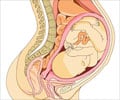To scrutinize the number of still births and the possible reasons for them, a survey was conducted in England, Wales and Northern Ireland.
To scrutinize the number of still births and the possible reasons for them, a survey was conducted in England, Wales and Northern Ireland. The survey revealed that present statistics of stillborns remained unchanged upon comparison with statistics of the early 1990’s. More than one in 200 pregnancies resulted in stillbirth, the survey showed.
The investigation into Maternal and Child Health (CEMACH) revealed that there were 3,600 stillbirths in 2005. This trend appeared to be common with the below 20 age group, the above 40 and amongst the ethnic minority group. The CEMACH is concerned about the possibility of these numbers going up which makes it imperative to find out the reasons behind the problem.The survey showed that one-third of still births took place after the baby had made it to full term. The rate of still births touched 5.5 per 1,000 births. The report also established the pronounced risk of stillbirths amongst Black and Asian women in contrast to the Whites.
The prevailing reasons for still births include congenital defects in the brain, heart or other organs, especially when the organs had not developed fully. Maternal hemorrhage or asphyxiation during childbirth is also a widely occurring cause.
The non-medical reasons certainly point towards poor nutrition of women especially those from underprivileged nations. Such women carry a double risk of having stillborns. The report stresses the need for better strategies to evaluate risk categories and implement necessary changes that can impact stillbirth numbers.
Richard Congdon, chief executive of CEMACH, said: "The rapid improvement in recent years in the survival prospects of babies who have been born very prematurely is highly welcome. But unfortunately there seem to be deep-seated reasons why we are not seeing the same improvement in the number of stillbirths. We believe this needs attention."
Jim Dornan, vice president of the Royal College of Obstetricians and Gynecologists (RCOG), added: "The results of the latest CEMACH study of perinatal mortality shows that the occurrence of stillbirth is still a major and tragic problem in this country. Advances in technology mean that neonatal mortality through premature births has fallen but stillbirths present us with a challenge. We need to know more about why stillbirths happen.”
Source-Medindia
SAV/B








